As a car owner, you may wonder if using an extension cord with a battery charger is possible. Fortunately, we have done some research for you, and here is what we found.
Yes, you can use an extension cord with a car battery charger. But it is not always advisable. If you must, ensure that the cord has a higher current rating than the charger requires.
You need to be careful when using an extension cord with a car battery charger. Keep reading to get detailed information about car battery chargers.
Can I Use An Extension Cord With A Car Battery Charger?
When providing an answer to this question, a solid understanding of an extension cord is essential. An extension cord, sometimes called connecting cord, helps to build connections between various electrical components.
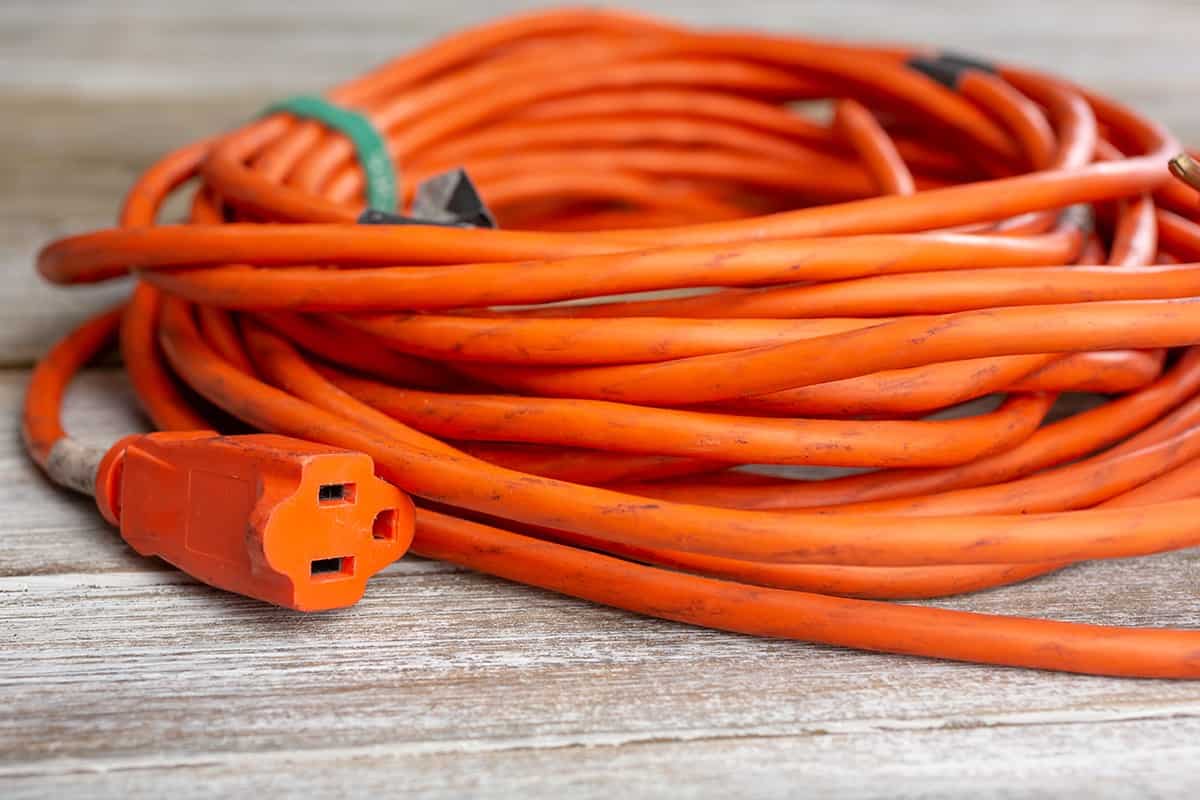
One popular use of an extension cord is to connect electronic gadgets to power outlets located in areas the device's power cord cannot reach.
There is no problem using an extension cord with your car battery charger. However, it is not recommended to do so unless absolutely necessary.
If you need to connect a battery charger to your battery, it is okay to use an extension cord. The battery charger supplies a voltage that is slightly higher than 12 volts to the battery so it can be charged. Therefore, it should not pose much of a risk.
But always try to exercise caution while carrying this out. Also, it is always recommended to use a cord with a higher current rating than the charger requires. You can check the tags on the cord and charger for the current rating.
If the amperage of the extension cord is not checked, it is likely that the battery charger will melt, burn or overheat, leading to a possible fire outbreak. Also, the battery will start heating up when it is supplied with 16 V or higher.
Does An Extension Cord Damage A Car Battery Charger?
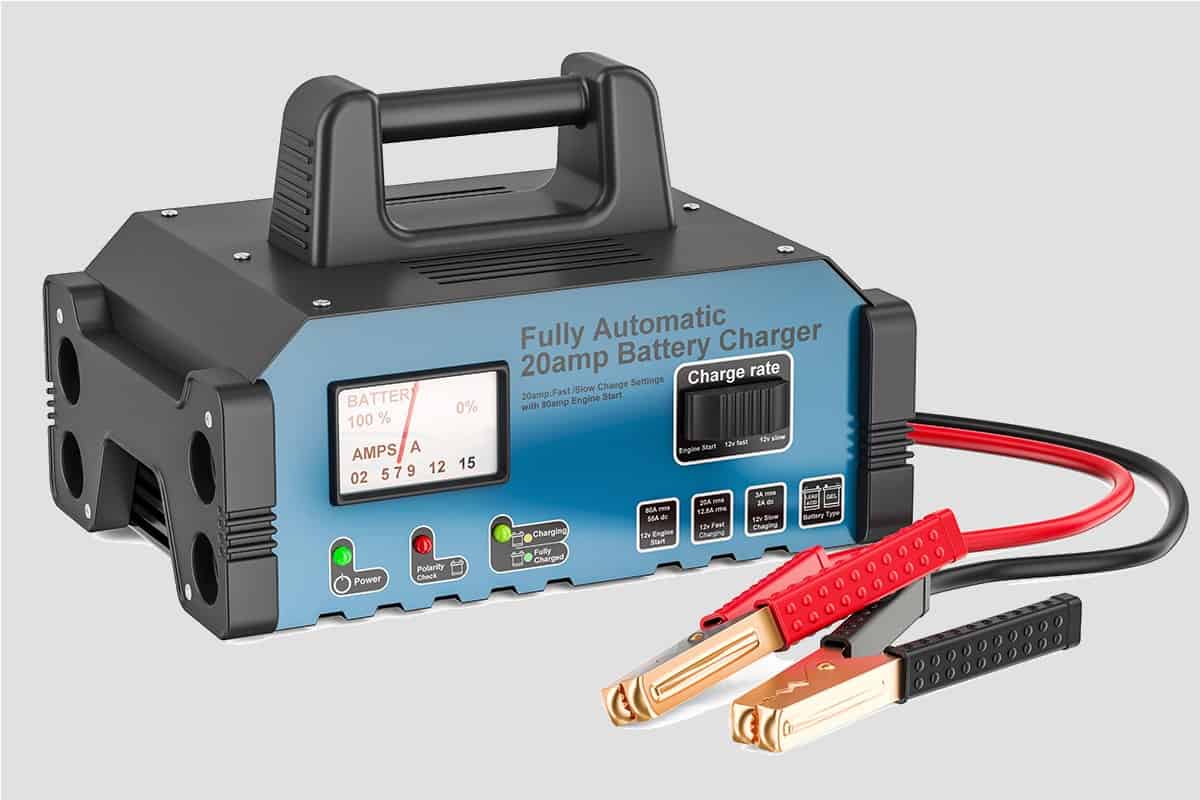
Yes, it is possible for an extension cord to damage a car battery charger. So, when charging a car battery, try as much as possible not to use extension cords. The use of extension cables for an extended period of time is not recommended.
Using an extension cord with a power-hungry device like a battery charger for a long period of time is dangerous because the total current flowing through the cord could exceed its rated capacity.
On the other hand, some car battery chargers are designed to be used safely with an extension cord. When too much current flows through, most battery chargers feature a built-in circuit breaker that cuts power. This feature safeguards the charger and battery from being damaged due to short circuits or overloads.
Click here to see this extension cord on Amazon.
What Kind Of Extension Cord Do I Need To Charge A Car Battery?
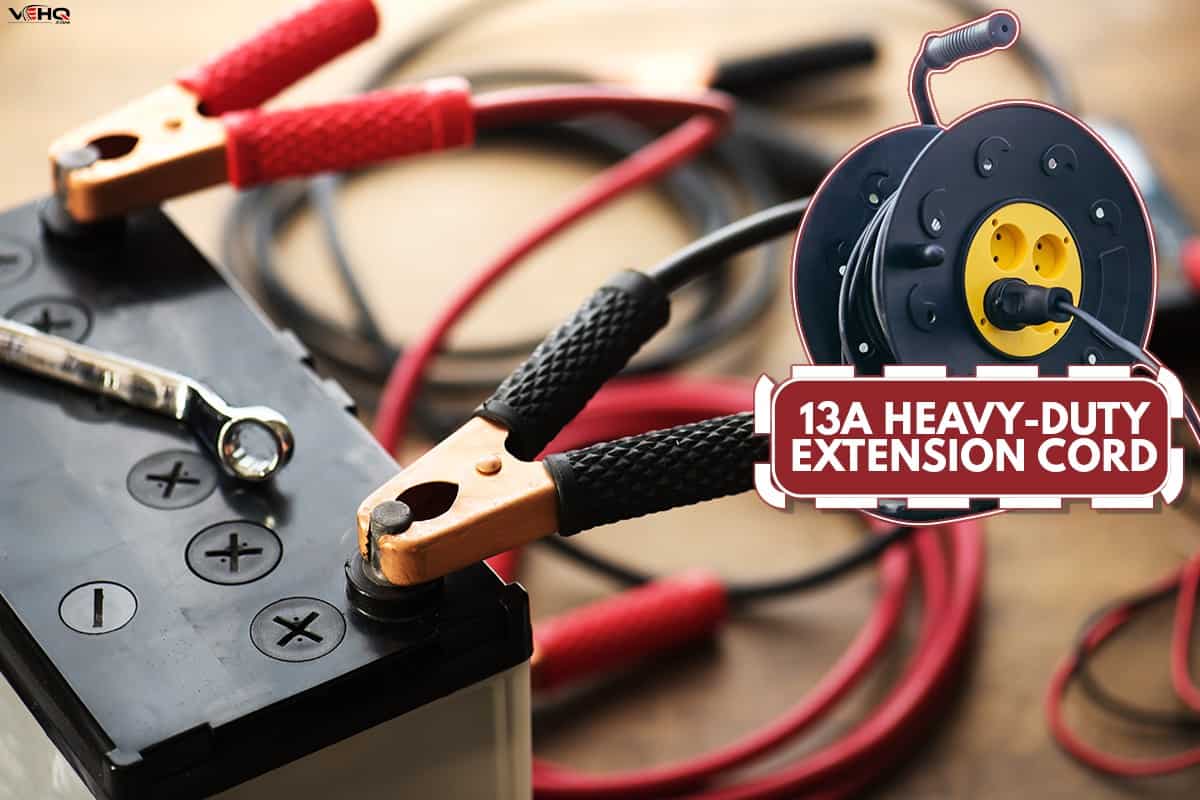
If you intend to use an extension cord, only extension cables rated for a continuous current of 13 amps are recommended for use with automobile battery chargers sold as heavy-duty. Anything less than a 13A heavy-duty extension cord poses a risk to your vehicle's battery.
For this reason, extensions with ratings lower than 13A should not be used because their sole purpose is to supply electricity to devices and appliances that draw a low current. So, never try charging a car battery with a household extension cord with multiple sockets.
However, keep in mind that the majority of extension cords are not designed to be used for an extended period of time, which is required for charging a vehicle's battery.
As a result of this, certain manufacturers view them as a potential source of fire. The risk is posed by overheating since most extension cords will heat up if they are used for a long period.
How Many Amps Do I Need For A Car Battery Charger?
A typical battery charger typically delivers a charge at a rate of about 2 amps, which means that it takes 24 hours to supply the 48 amps necessary to fully charge a dead battery (holds 48 amp hours).
However, there is a wide variety of chargers on the market with different charge speeds, ranging from 2 amps all the way up to 10 amps. When the charge output is higher, a dead battery is recharged and brought back to life at a quicker rate.
On the other hand, fast charging should be avoided because it might cause the battery plates to buckle. It is advisable to charge the battery at a gradual or slow rate.
The rate of slow charging might vary greatly based on the kind and capacity of the battery. When it comes to charging an automotive battery, a charge of 10 amps or less is considered a slow charge, while a charge of 20 amps or more is often regarded as a fast charge.
Click here to see this battery charger on Amazon.
How Do I Wire An Extension Cord To A Car Battery?
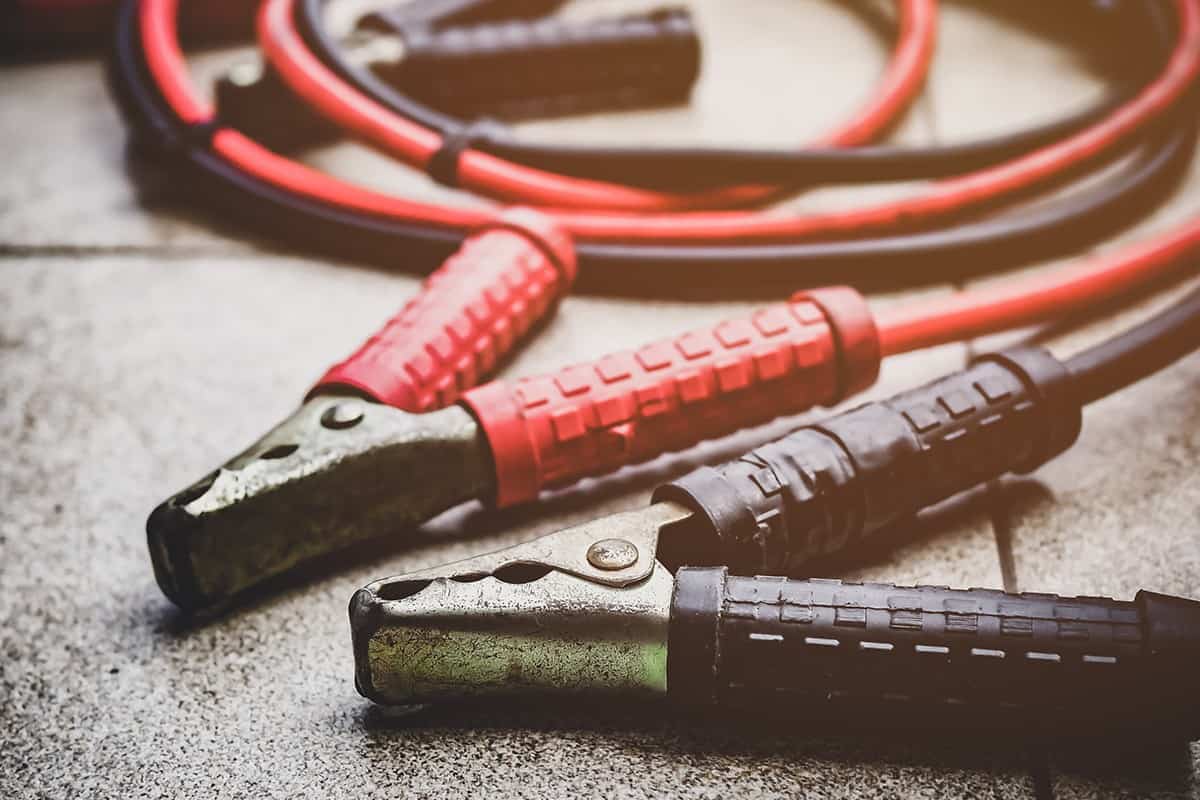
To wire an extension cord to the car battery, you need to use the jumper cables. These cables can be found in extension cords. All you have to do is link the cord to the battery terminal with the clips. If you check on the other side of the cord, you will find another port. Simply plug it into your inverter.
Some extension cords have jumpers that can link them to the battery's positive and negative terminals. It is okay to use the cord when 12V DC appliances are involved. The cord can also be used to connect the battery to an inverter. The inverter helps in changing the DC into AC.
How Long Does It Take To Charge A 12 Volt Battery At 5 Amps?
When using a battery charger with 20 amps, it will typically take between two and four hours to completely charge a standard-sized automobile battery. As a result, charging your battery with a 5 amp charger may take around 12 to 24 hours.
The charging time is greatly dependent on the size of the vehicle's battery as well as the power output of the charger. Chargers for automotive batteries typically operate at a rate of approximately 5 amps.
It would take approximately 10 hours to fully charge a 12-volt battery, going from completely dead to fully loaded, but you can start your car within an hour of charging it.
While calculating the charging rate, your first step is to examine your battery charger to determine the amount of ampere it produces. A higher amperage will speed up the process of charging your battery. A low ampere is preferable when charging a battery for maintenance over extended periods of time.
Additionally, you need to consider the size of your vehicle's battery as well as the type of battery it uses. A battery with a capacity of 40 to 80 ampere-hours (Ah) is the kind mostly used in vehicles. You should consider these factors while calculating your car batteries' charging rates.
Do You Put Positive Or Negative On First With Battery Charger?
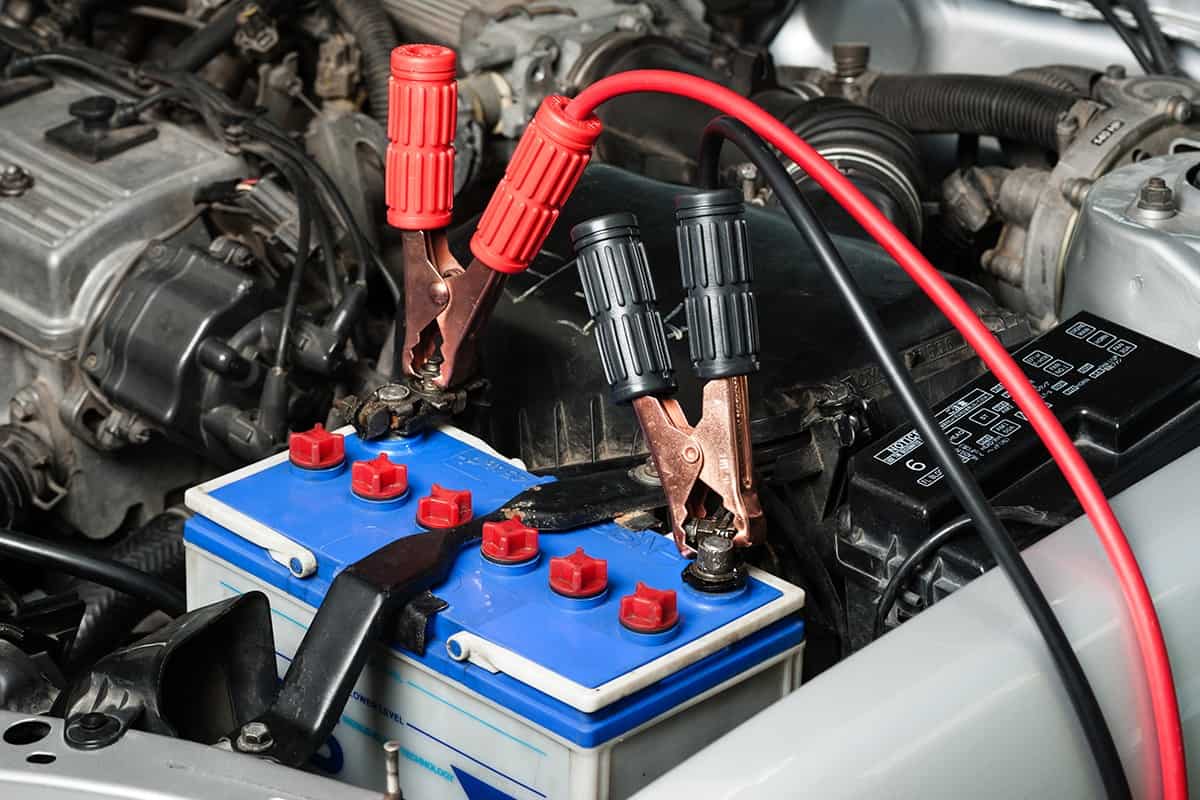
When connecting a battery charger to your car's battery, begin by connecting the positive (red) clamp to the positive post on the battery. You should see an indicator that looks like a plus sign on it. After that, connect the negative (black) clamp terminal.
However, when removing the battery charger from the battery, do so in reverse order. Start by removing the negative terminal and then move on to the positive terminal.
To Wrap Up
There is nothing wrong with using an extension cord with a battery charger. However, you have to be careful when using the cord to avoid damage. It is recommended to use a cord that has more current rating than the charger requires. To know the current rating, check the tags on the cord and charger.
If you enjoyed reading this post, here are similar articles you may like:
Can I Start A Car With A Battery Charger Connected?
What Type Of Battery Charger Is Best For Electrolysis?
Why Does My Schumacher Battery Charger Turn On And Off Repeatedly?


